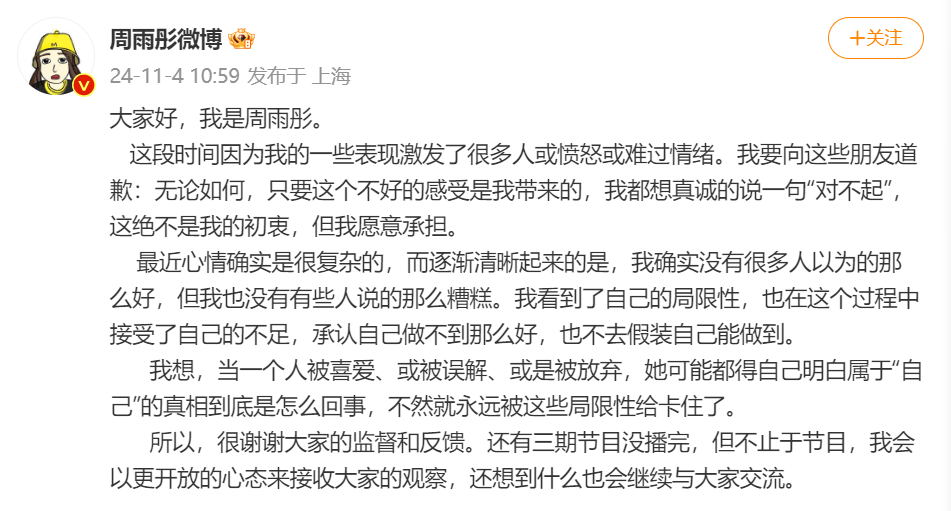
“The Flowers and the Youth: Silk Road Season” (hereinafter referred to as “Flower Youth 5”) has received an impressive score of 9.2 on Douban, redefining the “Flower Studies” that previously emphasized conflict. This has also significantly boosted the public image of its participants, which may have “tempted” some celebrities to join “The Flowers and the Youth 6” (hereinafter referred to as “Flower Youth 6”).

The nine celebrities participating in “Flower Youth 6”
After the broadcast of “Flower Youth 6,” one can only wonder if the celebrities who worked hard to secure their spots feel regret. Since its release, “Flower Youth 6” has been embroiled in continuous controversy, reviving online discussions about “Flower Studies” — not the redefined version from “Flower Youth 5,” but the original framework established by “Flower Youth 2.”


The stark contrast in ratings between “Flower Youth 5” and “Flower Youth 6”
This season, the stars most scrutinized by public opinion are Zhou Yutong, Rong Zishan, and Hou Minghao. Various “Flower Studies” materials have appeared all over the internet, summarizing their flaws throughout the show.
The rise of “Flower Studies” or “X Studies” highlights a profound shift in how internet users engage with variety shows. In the past, audiences viewed these shows primarily as a source of entertainment, seeking light-hearted laughs or temporary emotional release. However, nowadays, many fans approach variety shows with an analytical, even “academic” mindset, diving deep into the nuances of the guests' performances. This doesn’t mean they genuinely treat these shows as subjects for scholarly discussion; instead, they revel in observing the subtleties of stars' facial expressions, subtext in their words, and even accidental gestures, extracting enjoyment from their investigations.
Many stars struggle to adapt to these interpretations, perceiving them as overly harsh, as if any imperfection is magnified. However, this scrutiny is also the audience's right. As the saying goes, “All the gifts bestowed by fate already have their prices marked in secret.” When a star decides to participate in a reality show, having accepted a price they find satisfactory with the expectation of expected returns, they have implicitly agreed to embrace public judgment.
In today's highly developed entertainment industry, reality shows have become vital platforms for stars to showcase themselves and gain fame and profit; for many celebrities, participation is essential for career growth, enhancing visibility and commercial value. Stars must surrender part of their rights—placing segments of their private lives and public personas under public scrutiny, ready to face opinions coming from all directions.
This exposure is inherent to reality shows and is the “price” celebrities must pay to gain fame and fortune. Celebrities cannot expect to reap rewards from these shows while also refusing public judgment; such a situation simply doesn't exist.
Nevertheless, the stirring “Flower Studies” sparked by “Flower Youth 6” vividly illustrates the changing attitudes of internet users towards reality shows in this age of information overload, where short videos dominate.
The most fundamental shift is: the evaluation after watching the show has transformed into a carnival-style judgment online.
A rough observation reveals several characteristics.
First characteristic: Fragmented viewing.
Many viewers no longer rely on fully watching a complete episode to gather information and entertainment; instead, they piece together their understanding of the entire show through clips, highlights, and summarized controversial moments found on social media, short video platforms, or online forums. These snippets are often carefully curated to emphasize conflict or confrontational moments, quickly grabbing attention and igniting discussions. In this fragmented consumption model, viewers rapidly glean the essence of the program and select what piques their interest for discussion.
For instance, while an episode of “Flower Youth 6” runs for two to three hours, the extracted clips might only be one or two minutes long, presenting a very incomplete picture. Fragmented viewing can lead to an imbalanced understanding of the broader context, character development, and underlying stories, resulting in certain stars suffering misunderstandings or excessive criticism without comprehensive knowledge.

Zhou Yutong remembered to buy electrolyte water for the ill Song Qian while out having fun

Rong Zishan asked the hotel front desk if they could cook noodles for the patient in English. After receiving a negative response, he decided to buy noodles from a shop a kilometer away
Second characteristic: Entertainment-seeking participation.
Facing a wide array of homogenized variety shows, audiences crave fresh and interesting content. When a show provides ample discussion material, it naturally attracts widespread attention. However, many internet users do not pursue deep understanding or comprehensive viewing but rather adopt a mindset of seeking fun, joining the buzz, engaging in online revelry, and relieving boredom. When they catch a funny moment from short videos or learn of a controversial point from trending topics, they immediately join discussions, comment, like, or share, fulfilling their instinct for immediate entertainment and social sharing, thereby turning certain show segments into hot topics.
In this superficial mode of participation, online users can easily be misled by partial information or deliberately edited clips, leading to one-sided assessments of the show or its stars. For example, many viewers may never have actually watched “Flower Youth 6,” yet this doesn’t stop them from being acutely aware of the various conflicts within it or changing their attitudes towards a particular star from indifference to strong aversion, readily liking negative comments about that celebrity.

The so-called public “judgment” of Chen Hao wasn’t exaggerated; it was merely everyone airing out their grievances
Third characteristic: Moral judgment.
When audiences scrutinize reality shows with a magnifying glass, every minor action or casual remark from a star can be blown out of proportion, elevated to moral and personal evaluations, inciting widespread online condemnation. This moral judgment operates on a binary, black-and-white thought process, categorizing phenomena into starkly dichotomous categories: good and bad, right and wrong, neglecting the complexity and multiplicity of human nature, leading to simplistic negative evaluations of individuals’ morals.

During Hou Minghao's birthday, everyone secretly sent him their wishes in a photo he couldn’t see, which was thoughtful yet creative. Why does the whole internet focus only on “four people eating at a table meant for nine”?
Once a topic trends, countless netizens swarm in, joining this moral judgment frenzy. In these situations, individual voices often drown in the swell of collective emotion, resulting in rational perspectives struggling to be heard. The anonymity of the internet grants some individuals cover to express themselves more boldly, sometimes resorting to derogatory language to share their opinions. The comment sections of social media for some stars of “Flower Youth 6” have completely spiraled out of control, with many comments exceeding reasonable critique, morphing into personal denigration and insults.
Fourth characteristic: Emotional venting.
In today’s fast-paced society with immense pressure, people seek outlets to release their internal tensions and dissatisfaction. Those reality shows that give rise to “X Studies,” due to their proximity to life and rich interpretative possibilities, become outlets for many to vent emotions. Nowadays, many viewers use the term “judgment” while watching variety shows, sometimes humorously alluding to “evaluation,” but at times it signifies a skewed moral judgment marked by bias and elitism, seeking justification for emotional release.
In “Flower Youth 6,” some stars' expressions were meticulously captured and exaggeratedly interpreted; even a simple blank expression was read as impatience or arrogance or “hostile,” thus generating a barrage of negative comments. When exaggerated interpretations and insults toward a star become publicly accepted opinion, “it’s like throwing loaded weapons into the streets; everyone—villain or good person—can pick them up and use them,” this is unfair to the stars and exacerbates social tension.

The online accusations against Song Qian’s friend paying for a meal brought about Zhou Yutong's “hostility,” leading to all sorts of negative assumptions about her “bad” character.

However, in the normal footage, Zhou Yutong was clearly enjoying her meal.
Some may argue: are you trying to “whitewash” someone? In truth, that’s not the case. I must admit after watching the show that some stars in “Flower Youth 6” did indeed reveal less-than-appealing sides during the reality show—this is a miscalculated choice made jointly by their management teams and the stars themselves; their personalities simply do not fit in a continuously recorded reality show, which essentially means allowing celebrities to dismantle their public personas that were crafted through successful roles.
But it must also be said objectively: the offense does not warrant such severity; it is truly not that serious.
On one hand, upon reflection, not many can withstand the scrutiny of a magnifying glass. In reality shows, every move of the stars is captured and magnified; every expression and every word undergoes repeated examination and interpretation. It is entirely normal that flaws appear in such a highly transparent environment. Audiences have no duty to empathize with the stars, but making sweeping moral and personality judgments is highly arbitrary and creates a less tolerant social atmosphere.
This “intolerance” extends beyond celebrities; it encompasses how we treat our family, friends, and colleagues. For instance, on platforms like Xiaohongshu or Douban, it’s common to see users post accusations against people in their lives, often over trivial matters, yet the comment sections almost uniformly urge “cutting ties” or “ending friendships.” People increasingly lack basic tolerance for the mistakes of others and the respect that should accompany differing viewpoints, quickly escalating to questioning personal character. Continued in this fashion, it will only lead to strained interpersonal relationships and increase individual atomization.
On the other hand, certain stars from the show have already become extremely vilified in public opinion; many viewers fixate on their every action and expression on the show, interpreting everything in exaggerated ways, whether “manufacturing” conflicts or amplifying minor issues, often distorting the basic facts.
While it is true that reality shows are filmed for audience viewing and stars participating must be prepared for judgment, approaching variety shows with a judgmental lens must also adhere to certain boundaries and ethics. If demeaning evaluations of an individual are made (regardless of whether they’re a star), without having viewed the show comprehensively or grasped the context of the clips, one should resist the impulse to follow suit based on negative interpretations from influencers or marketing accounts. Even if you genuinely dislike a star’s actions after watching the show, be cautious against inflated criticisms, emotional evaluations, and moral condemnations. You might think you’re discerning personal character through details—but what you highlight are the dark details, thereby only seeing a fraction of the reality.
Don’t assume that this is merely about seeking entertainment; upon deeper reflection, it’s frightening to “publicly display” an individual online. The repercussions of such a toxic atmosphere landing on a star, you might feel “two hundred thousand” is warranted; you might think any notoriety is still attention, and who knows, they might end up as a top star through negative publicity. The issue is, once this wave of “judgment” becomes a

